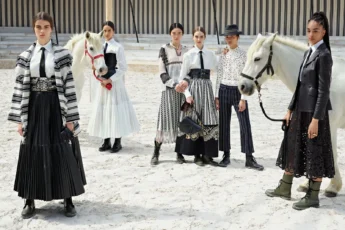Kering conglomerate with climate decision

Kering is a French luxury conglomerate that includes fashion giants such as, Gucci, Saint Laurent, Alexander McQueen, or Balenciaga. Together with LVMH, they are two of the largest corporations centered around luxury fashion. It is headed by François-Henri Pinault, who also chairs a foundation of the same name that addresses violence against women worldwide. In addition, the conglomerate is involved in many other social activities, supports the development of young talent and collaborates with art schools.

Last Friday, Kering officially pledged to reduce greenhouse gas emissions by 40% by 2035. This idea thus fits into the vision for responsible luxury and complements its growing sustainable development strategy. This is a huge step toward a climate revolution in the fashion industry. What exactly is Kering promising and what impact will this decision have?
Luxury fashion, and the climate
How does the fashion industry affect the climate? We now have enough information to know that fashion is a major contributor to negative changes in our climate. It is estimated that the fashion industry is responsible for as much as 2 to 8 percent of global CO2 emissions. To illustrate the situation, that’s more than air, sea and shipping combined. The water consumption statistics are even more shocking – some 215 trillion liters of water are used by industry each year.
In addition, clothes of the so-called fast fashion segment are produced on a huge scale and more than half of the world’s production goes to landfills. All this contributes to mass consumption of goods. Luxury products are definitely more durable. By focusing on high-quality materials, they are built to last longer than mass-market goods. And this in turn requires less incineration and textile waste. In addition, the elitism of luxury clothing makes these products available in much smaller quantities.
So while undoubtedly the luxury fashion segment is contributing its share to the climate catastrophe, it is a much smaller percentage. Exclusive brands can afford to produce fewer specialized and well-made products. Most of them have already taken steps to improve the climate situation, knowing that they can act for the climate even if it comes at an increased cost.
Balanced development
The world’s luxury fashion giants have been slowly making inroads into sustainability for the past few years. It turns out that Kering with its statement was not the first, LVMH has also been targeting Scope 1 and Scope 2 emissions (greenhouse gas emissions from energy consumption in plants and stores) for some time now. by 50% by 2026 aims for a 55% reduction in Scope 3-related greenhouse gas emissions per unit of value added by 2030.
Prada is also trying to reduce its carbon footprint, which has already achieved its goal of converting its signature line of nylon clothing and accessories entirely to recycled material by 2021. The brand currently produces more than 100 million yards a year of its Re-Nylon fabric from plastic and consumer waste.
What is Kering’s plan?
“We are now setting this new absolute target, covering scopes 1, 2 and 3 of the Greenhouse Gas Protocol, because if we want to truly decarbonize our global businesses, we need to move from carbon intensity reductions to absolute reductions”said François-Henri Pinault.
As we mentioned, Kering manages luxury companies, including, among others. Gucci, Saint Laurent, Bottega Veneta, Balenciaga, Alexander McQueen. His influence on brands and their policies is significant, so all this points to positive changes in the future. Kering is set to release its 2020-2023 Sustainability Progress Report, which will describe its new biodiversity strategy. Kering is once again showing its commitment to bringing positive change and impact to the industry. Undoubtedly, this step will bear fruit in the near future.








Leave a Comment